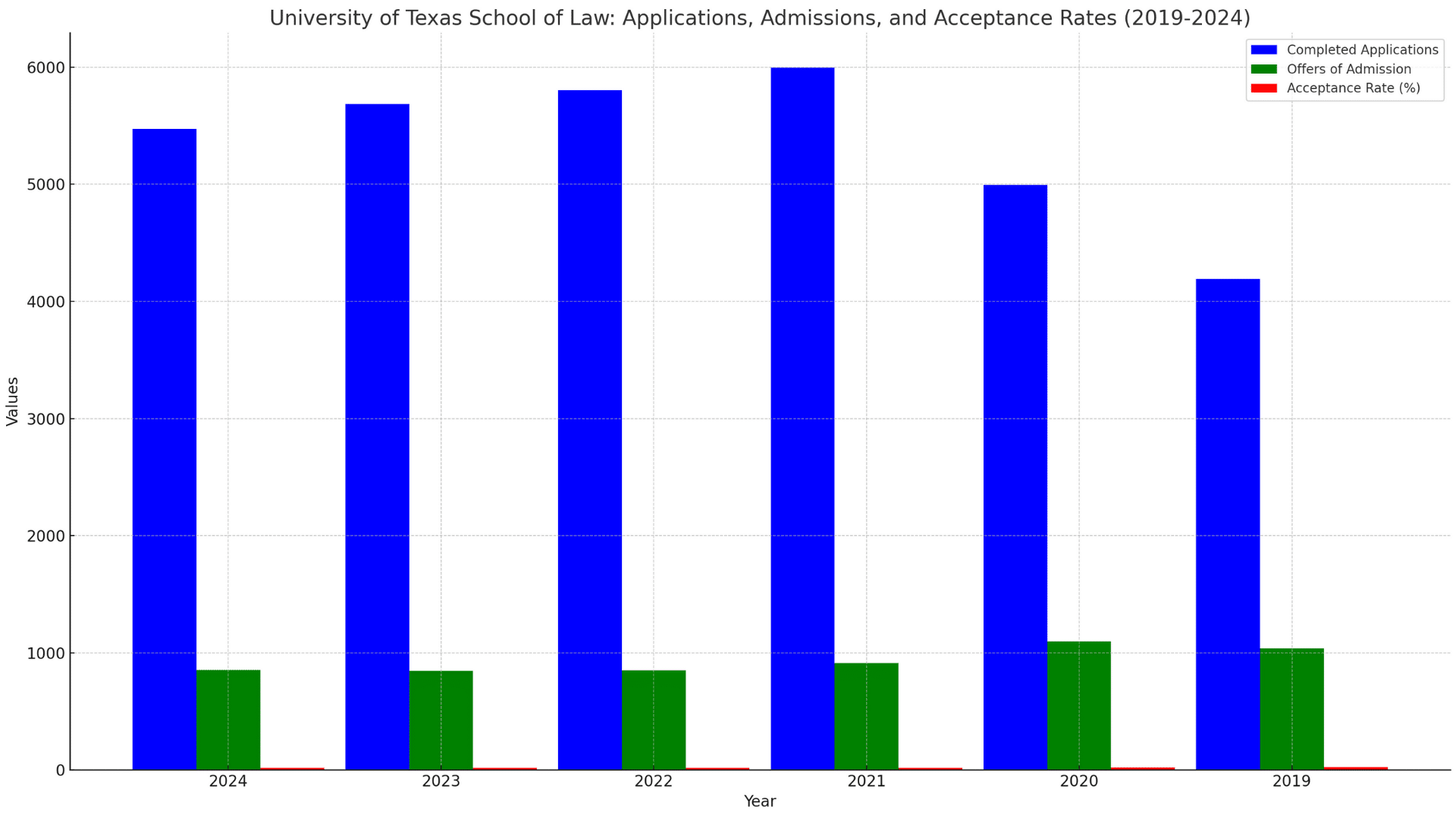Ever wondered what makes getting into law school so competitive?
The University of Texas law acceptance rate shows just how selective this top school really is.
When schools accept only a small portion of applicants, it reveals something important. It means many students want to attend, but the school maintains very high standards.
Students must have stellar applications in order to stand a chance of getting into this prestigious school.
A low acceptance rate like UT’s tells you the school expects excellent grades and test scores. It also signals that competition among applicants is fierce, making strong preparation essential for success
UT Austin Law School Acceptance Rate for 2024–2025
UT Austin Law School received 5,475 applications during the 2024–2025 admissions cycle.
The school extended admission offers to 854 applicants, creating an acceptance rate of 15.6%. This competitive rate reflects the school’s selective admissions process.
Of those admitted students, 269 chose to enroll, resulting in a yield rate of 31.5%. These numbers highlight the intense competition among prospective law students.
The relatively high yield rate suggests that many admitted students view UT Austin Law as their top choice, reflecting the school’s strong reputation and appeal.
Trends in UT Law Acceptance Rate Over the Years

UT Austin Law School’s acceptance rates have shown remarkable consistency over the past three years.
The rates fluctuated minimally between 14.56% and 15.24%, demonstrating the school’s stable selectivity standards.
This steady pattern reflects consistent applicant pool quality and the institution’s commitment to maintaining rigorous admission criteria across different cycles.
Class Profile: Academic Credentials of Admitted Students
The admitted students at UT Austin Law School represent some of the highest academic achievers nationwide.
These credentials reflect the competitive nature of the admissions process and set clear benchmarks for prospective applicants.
| ACADEMIC METRIC | 25TH PERCENTILE | MEDIAN (50TH) | 75TH PERCENTILE |
|---|---|---|---|
| LSAT Score | 168 | 171 | 172 |
| GPA | 3.72 | 3.89 | 3.96 |
Key Insight: Even bottom-quartile admits maintain exceptional credentials, with LSAT scores above the 95th percentile nationally.
Residency and Demographics of UT Austin Law School
UT Austin Law School maintains a diverse student body while fulfilling its mission as a public institution.
The school balances state residency requirements with efforts to create an inclusive and geographically varied learning environment.
- Texas Residency Requirement: As a public institution, UT Austin Law School reserves 65% of its seats for Texas residents.
- Gender Distribution: Women comprise 46% of the student body.
- Diversity: 41% of students identify as minority students.
- Age Profile: The average age of enrolled students is 24 years old.
- Geographic Reach: Students represent all 30 U.S. states, including Washington, D.C..
UT Austin Law successfully combines its commitment to serving Texas residents with creating a nationally diverse academic community that enriches the educational experience for all students.
Career Outcomes and Bar Passage Rates for UT Austin Law School

UT Austin Law graduates achieve exceptional career success. This reflects the quality of education and professional preparation.
The school’s strong industry connections consistently produce graduates ready for immediate professional impact.
1. Bar Exam Performance
UT Austin Law School maintains exceptional bar exam results across multiple jurisdictions.
Graduates consistently outperform national averages in this critical professional milestone. The school’s rigorous curriculum is complemented by comprehensive bar preparation programs.
Experienced faculty mentorship ensures students develop critical thinking and legal knowledge. This preparation opens doors to successful legal practice careers.
Pass Percentage: 94% of graduates pass the bar exam on their first attempt
2. Private Practice Employment
Most UT Austin Law graduates secure coveted positions at prestigious law firms.
These range from elite BigLaw firms to specialized boutique practices nationwide. This remarkable placement rate demonstrates strong employer confidence in graduates.
The comprehensive legal training emphasizes practical skills and professional ethics. Students receive client service excellence training from day one.
Placement Rate: 59.3% of graduates enter private practice positions
3. Judicial and Public Service Careers
UT Austin Law graduates pursue distinguished career paths in judicial chambers. They also work in public interest organizations nationwide.
Many secure competitive clerkships with federal and state judges. Others make meaningful impacts in government agencies and nonprofits.
These prestigious positions showcase the school’s commitment to ethical legal professionals.
Career Distribution: 17.2% obtain judicial clerkships, 11.2% enter public interest law
Tips for Strengthening Your UT Austin Law School Application
Success at UT Austin Law School requires strategic preparation and exceptional credentials.
These key strategies can significantly enhance your competitiveness in the admissions process.
- Academic Excellence: Target LSAT scores above 168 and maintain a GPA over 3.7.
- Compelling Personal Statement: Craft a unique narrative showcasing your passion for law.
- Strong Letters of Recommendation: Secure endorsements from professors familiar with your work.
- Relevant Legal Experience: Pursue internships, volunteer work, or paralegal positions.
- Early Application Submission: Apply by early decision deadlines for improved acceptance odds.
Following these strategic steps positions you as a competitive candidate ready to thrive in UT Austin Law’s demanding academic environment.
The Bottom Line
UT Austin Law School stands as a beacon of legal excellence, consistently ranking among the nation’s top law programs.
The diverse student body, exceptional bar passage rates, and strong employment statistics reflect decades of academic commitment.
For aspiring lawyers ready to join this prestigious institution, thorough preparation and strategic application planning remain essential.
UT Austin Law offers not just a degree, but a gateway to influential legal careers that shape communities and justice systems nationwide.
Frequently Asked Questions (FAQs)
What GPA and LSAT Score Do I Need to Get into UT Austin Law School?
Competitive applicants typically need an LSAT score of 168+ and a GPA above 3.7.
Does UT Austin Law School Give Preference to Texas Residents?
Yes, 65% of seats are reserved for Texas residents as required by state law.
What is the Employment Rate for UT Austin Law Graduates?
Over 93% of graduates secure full-time legal employment within nine months of graduation.












